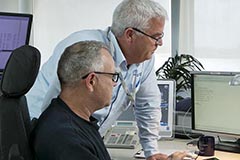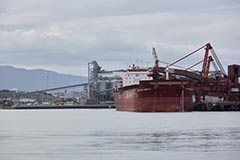The primary objective of the Port Authority of New South Wales (the Port Authority) Remuneration and Human Resources Committee (Committee) is to assist the Port Authority in fulfilling its corporate governance responsibilities in regard to:
1.1. Overall remuneration strategy and remuneration policies for the Chief Executive Officer and Executive Management;
1.2. Performance of the Chief Executive Officer and Executive Management;
1.3. Employment terms and conditions of the Chief Executive Officer and Executive Management;
1.4. Human resources management including succession planning, talent development and employee engagement;
1.5. Other matters delegated to the Committee by the Board.
The Committee is authorised, within the scope of its responsibilities, to:
2.1. Seek information it requires from any Port Authority employee or contractor;
2.2. Take independent legal, financial, remuneration or other professional advice or assistance, at the reasonable expense of the Port Authority. Unless a conflict exists or to do so would be inconsistent with the Committee’s duties, the Committee is to request such information, professional advice or assistance permitted under this clause via the Chairman of the Board.
3.1. The Committee shall comprise no less than three and no more than four Non-executive Directors of the Board;
3.1.1. Committee members and the Committee Chairman shall be appointed by the Board;
3.2. Regular attendees to Committee meetings shall be the Chief Executive Officer, Executive General Manager Human Resources and Company Secretary who shall be the minute secretary of the Committee. The Committee may invite other persons to attend its meetings as required;
3.3. Any Director who is not a member of the Committee will have the right to attend any meeting of the Committee.
4.1. The Committee shall meet at least four times in each financial year. The Chairman will determine the procedure for meetings of the Committee;
4.2. A quorum shall be two Committee members;
4.3. All decisions of the Committee shall be determined on the basis of a majority vote of members. In any instance of a tied vote, the matter shall be referred to the Board;
4.4. When the Committee must reach a decision between meeting dates, this decision may be made by circular resolution. In carrying out a vote by circular resolution, the Chairman of the Committee has an obligation to attempt to contact all Committee members. A circular resolution will be passed only when the majority of Committee members vote in the affirmative.
5.1. The Company Secretary or delegate will be responsible for keeping all minutes of all meetings of the Committee. Once the minutes of each meeting have been reviewed by the Chairman of the Committee, they shall be submitted to the Board for information.
5.2. The Chairman of the Committee will inform the Board of the activities of each meeting of the Committee at the Board meeting immediately following the meeting of the Committee.
The key functions of the Committee are to review and approve, or where specified, recommend to the Board for approval, the remuneration, recruitment, retention, superannuation and termination policies and procedures for the CEO and senior executives, including the amount of performance payments. More specifically the duties are as follows:
6.1.1 Review the remuneration strategy of the Port Authority, ensuring it addresses retention and industry remuneration comparisons, links performance with rewards, and is aligned to long term strategic objectives;
6.1.2 Review the competitiveness of Port Authority’s executive management remuneration programs to ensure:
a) The attraction and retention of Executive Management; and
b) The motivation of Executive Management to achieve Port Authority’s strategic objectives;
6.1.3 Review trends in senior executive compensation, including reviewing and taking into account decisions made under the NSW Public Sector Wages Policy or by any other relevant public and private sector benchmarks, in recommending to the Board appropriate remuneration for executives;
6.1.4 Discuss and agree annual key performance indicators (KPIs) for the CEO and make recommendations in this regard to the Board;
6.1.5 Discuss and approve annual key performance indicators (KPIs) for the Executive Team;
6.1.6 Review the performance of the CEO and Executive Team against approved KPIs;
6.1.7 Review and recommend to the Board for approval the salary, bonus and other compensation for the CEO, ensuring that reward is linked to performance;
6.1.8 Review and approve the salaries, bonuses and other compensation for the Executive Management, ensuring that reward is linked to performance;
6.1.9 Review as appropriate from time to time the employment contracts of the CEO and Executive Management; and
6.1.10 Review periodic reports from management on matters relating to Port Authority employee appointments, practices, including but not limited to approving recruitment, executive development, remuneration packaging guidelines, superannuation, and termination policies.
6.2 Another key function of the Committee is to review progress of management in developing talent, monitoring staff engagement and diversity, and succession planning including:
6.2.1 Training requirements of the CEO and Executive Management;
6.2.2 Periodic reports from management on matters relating to human resources metrics such as leave balances, diversity, and employee retention rates;
6.2.3 Employee engagement surveys; and
6.2.4 CEO and Executive Management succession plans; and
6.3 Review any other matters delegated by the Board.
The Committee will:
7.1 Record proceedings of each meeting and circulate them to the Board.
7.2 Refer all recommendations of the committee in relation to the CEO’s contract, performance, salary, bonus and other compensation to the Board for approval;
7.3 Prepare an annual report to the Board, a summary of which is to be published in the corporate governance section of the Annual Report, outlining work performed by the Committee.
7.4 Ensure the Charter of the Committee is posted on the Port Authority website.
8.1. Members of the Committee agree at Committee meetings to comply with the ‘conflict of interest’ requirements of the Port Authority Board Charter, which are:
8.1.1. Committee members are required to disclose potential conflicts for recording in the Port Authority’s conflicts register. Committee members are required to update this register on an ongoing basis as circumstances change;
8.1.2. In relation to specific Committee decisions, the Committee complies with Clause 2, Schedule 10 of the Stated Owned Corporations Act 1989. A Committee member cannot take part in discussions or vote on a matter in which that Committee member has a material personal interest; unless the Committee resolves that the interest does not disqualify the Committee member.
9.1. New members will undergo an induction program to comply with the ‘Induction Program’ requirements of the Port Authority Board Charter, which are:
9.1.1. Upon appointment, the Company Secretary is responsible for arranging for the new Committee member to undertake an induction program to enable them to gain an understanding of the Port Authority’s business. A range of information is provided, including:
a) copies of relevant legislation
b) Code of Conduct
c) most recent annual report
d) Committee member profiles and contact details
e) the Committee Charter
f) Statement of Corporate Intent and Business Plan
g) recent Committee meeting minutes.
10.1. At least once a year the Committee will review this Charter. This review will include consultation with the Board. Any substantive changes to this Charter will be recommended by the Committee and formally approved by the Board.







